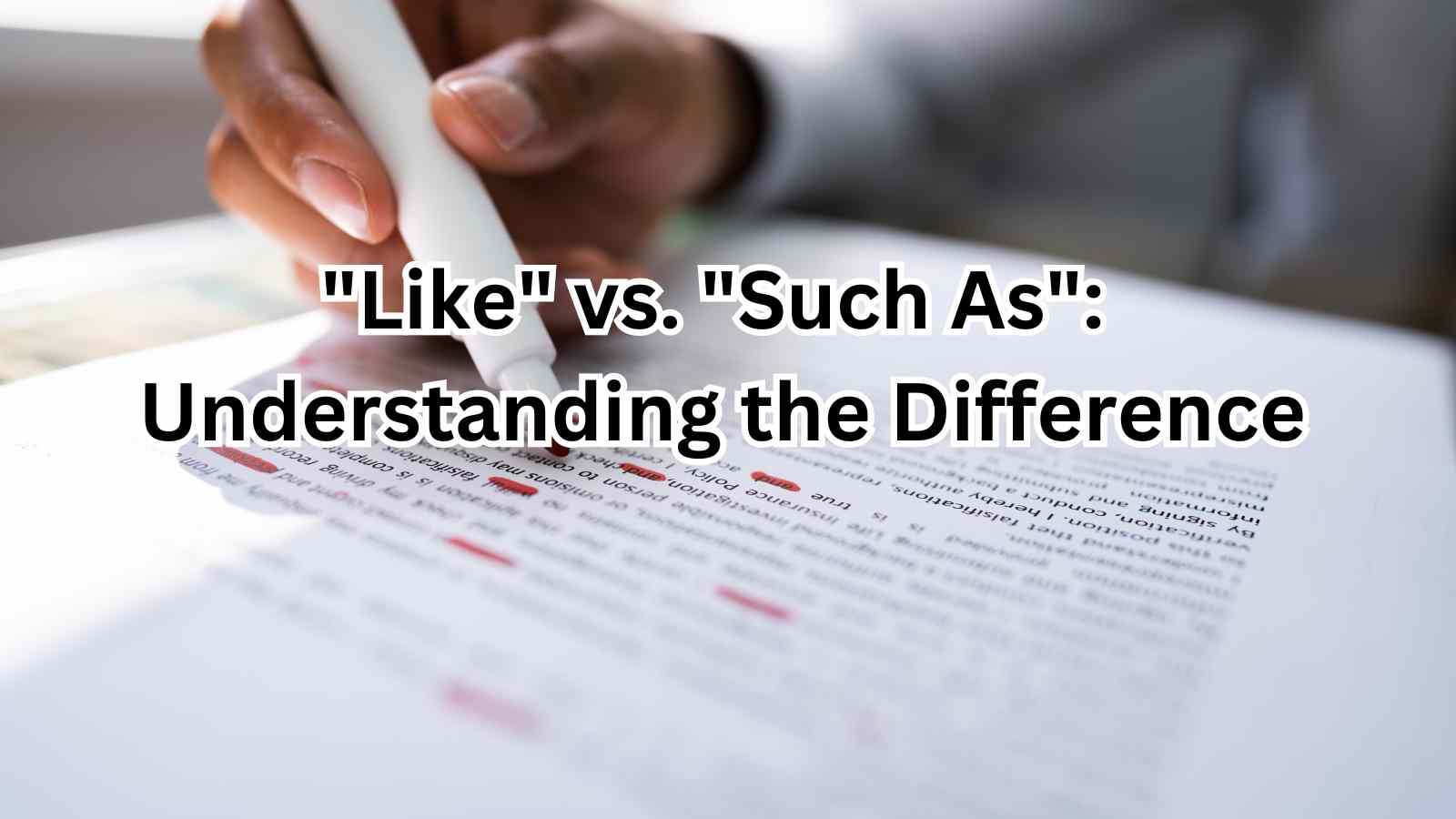“Like” vs. “Such As”: Understanding the Difference
In everyday speech and writing, people often use the terms “like” and “such as” interchangeably. However, these two phrases serve different purposes and should be used in distinct contexts. This article will explore the differences between “like” and “such as,” providing examples and guidelines for their proper usage.
“Like”: The word “like” is used to introduce examples that are similar to the subject being discussed, but not necessarily part of the same category. “Like” implies a comparison or resemblance between the examples and the subject. For instance:
- “She enjoys outdoor activities like hiking and camping.” In this sentence, hiking and camping are examples of outdoor activities, but they do not represent an exhaustive list.
“Such As”: On the other hand, “such as” is used to introduce specific examples that are directly related to the subject being discussed. These examples are typically part of the same category as the subject. For example:
- “She enjoys water sports, such as swimming and surfing.” Here, swimming and surfing are specific examples of water sports, and they belong to the same category as the subject.
Key Differences:
- Category: “Such as” introduces examples that are part of the same category as the subject, while “like” introduces examples that are similar but not necessarily part of the same category.
- Specificity: “Such as” is used to provide specific examples, while “like” is used for more general comparisons.
- Exhaustiveness: “Such as” often implies that the examples given are just a few from a broader list, while “like” does not necessarily suggest the existence of additional examples.
Common Mistakes: One common mistake is using “like” when “such as” would be more appropriate. For example:
- Incorrect: “The store sells fruits like apples, bananas, and oranges.”
- Correct: “The store sells fruits, such as apples, bananas, and oranges.” In this case, apples, bananas, and oranges are specific examples of fruits, so “such as” is the correct choice.
Conclusion: Understanding the difference between “like” and “such as” is essential for clear and precise communication. By using “like” for general comparisons and “such as” for specific examples within a category, writers can ensure that their intended meaning is accurately conveyed. Paying attention to these subtle distinctions can greatly enhance the quality and clarity of one’s writing.
Etymology of “Like”: The word “like” originates from the Old English word “gelīc,” which meant “similar” or “equal.” It is derived from the Proto-Germanic “*galīkaz,” which also gave rise to the German word “gleich” and the Dutch word “gelijk,” both meaning “similar.” The Proto-Germanic word is believed to be a compound of “*ga-” (a collective prefix) and “*līkaz” (meaning “body” or “form”). Over time, the meaning of “like” expanded to include its use as a preposition, conjunction, adjective, and verb, all relating to similarity or comparison.
Etymology of “Such As”: “Such as” is a phrase that combines the words “such” and “as.”
The word “such” comes from the Old English word “swylc,” which meant “of that kind.” It is derived from the Proto-Germanic “*swalīkaz,” a compound of “*swa-” (meaning “so” or “as”) and “*līkaz” (meaning “body” or “form”). The word “swylc” eventually evolved into “such” in Middle English.
The word “as” comes from the Old English word “eallswā,” which meant “just so” or “wholly so.” It is derived from the Proto-Germanic “*allaz” (meaning “all”) and “*swa” (meaning “so”). Over time, “eallswā” was shortened to “alswā,” and eventually to “as” in Middle English.
The phrase “such as” emerged in Middle English as a way to introduce specific examples or instances of a previously mentioned concept or category. It combines the idea of “of that kind” (“such”) with the notion of “in the same way” or “just so” (“as”) to present illustrative examples.
20 Practice questions for like and such as
The restaurant offers various Italian dishes, _____ lasagna, spaghetti carbonara, and risotto. a) like b) such as
She enjoys reading classic novels _____ “Pride and Prejudice” and “To Kill a Mockingbird.” a) like b) such as
The university offers several science programs, _____ biology, chemistry, and physics. a) like b) such as
He listens to rock bands _____ Led Zeppelin and Pink Floyd. a) like b) such as
The city has many tourist attractions, _____ the Eiffel Tower and the Louvre Museum. a) like b) such as
She likes to vacation in tropical destinations _____ Hawaii and the Caribbean. a) like b) such as
The store sells various electronics, _____ smartphones, laptops, and tablets. a) like b) such as
The conference featured speakers _____ renowned scientists and industry leaders. a) like b) such as
The zoo has many African animals, _____ lions, elephants, and giraffes. a) like b) such as
She enjoys water sports _____ swimming and surfing. a) like b) such as
The festival showcased various art forms, _____ painting, sculpture, and photography. a) like b) such as
He enjoys outdoor activities _____ hiking, camping, and fishing. a) like b) such as
The museum features exhibits on various historical periods, _____ ancient Egypt and the Roman Empire. a) like b) such as
She likes to cook international cuisines _____ Mexican, Thai, and Indian. a) like b) such as
The company provides various financial services, _____ banking, investment, and insurance. a) like b) such as
He listens to classical composers _____ Mozart, Beethoven, and Bach. a) like b) such as
The park has many recreational facilities, _____ playgrounds, tennis courts, and walking trails. a) like b) such as
She enjoys watching TV shows _____ “Friends” and “The Office.” a) like b) such as
The city has many public transportation options, _____ buses, trains, and subways. a) like b) such as
He likes to play various sports _____ basketball, soccer, and tennis. a) like b) such as
Lesson Plan: Understanding the Difference Between “Like” and “Such As”
Objective: Students will be able to understand the difference between “like” and “such as” and use them correctly in sentences.
Duration: 60 minutes
Materials:
- Whiteboard and markers
- Handouts with examples and practice exercises
- Projector (optional)
Introduction (10 minutes):
- Begin the lesson by writing two sentences on the board, one using “like” and the other using “such as.”
- Ask students if they can identify the difference between the two sentences.
- Explain that while “like” and “such as” are often used interchangeably, they serve different purposes.
Instruction (20 minutes):
- Define “like” as a word used to introduce examples that are similar to the subject being discussed, but not necessarily part of the same category.
- Define “such as” as a phrase used to introduce specific examples that are directly related to the subject and belong to the same category.
- Provide several examples of correct usage for both “like” and “such as.”
- Highlight the key differences between the two, including category, specificity, and exhaustiveness.
- Discuss common mistakes, such as using “like” when “such as” would be more appropriate.
Guided Practice (15 minutes):
- Distribute handouts with a mix of correct and incorrect sentences using “like” and “such as.”
- Have students work in pairs to identify and correct the mistakes in the sentences.
- Review the answers as a class, encouraging students to explain their reasoning.
Independent Practice (10 minutes):
- Provide students with a list of topics and ask them to write two sentences for each topic, one using “like” and the other using “such as.”
- Encourage students to share their sentences with a partner for feedback and discussion.
Closure (5 minutes):
- Recap the main points of the lesson, emphasizing the differences between “like” and “such as.”
- Encourage students to pay attention to their usage of these terms in their future writing and speaking.
Assessment:
- Observe student participation during guided and independent practice.
- Collect and review the sentences written during independent practice to assess understanding.
- Optionally, administer a brief quiz featuring sentences with “like” and “such as” for students to identify and correct.
Extension:
- Have students find examples of “like” and “such as” in their textbooks or other reading materials and discuss the effectiveness of their usage.
- Assign a short writing task that requires students to use both “like” and “such as” correctly in context.
- 100 Screenwriting Ideas to Get You Writing - January 20, 2026
- 100 Winter Storm Writing Prompts - January 17, 2026
- 100 Haunted House Story Starters: Craft Your Scariest Tale Yet - January 10, 2026




